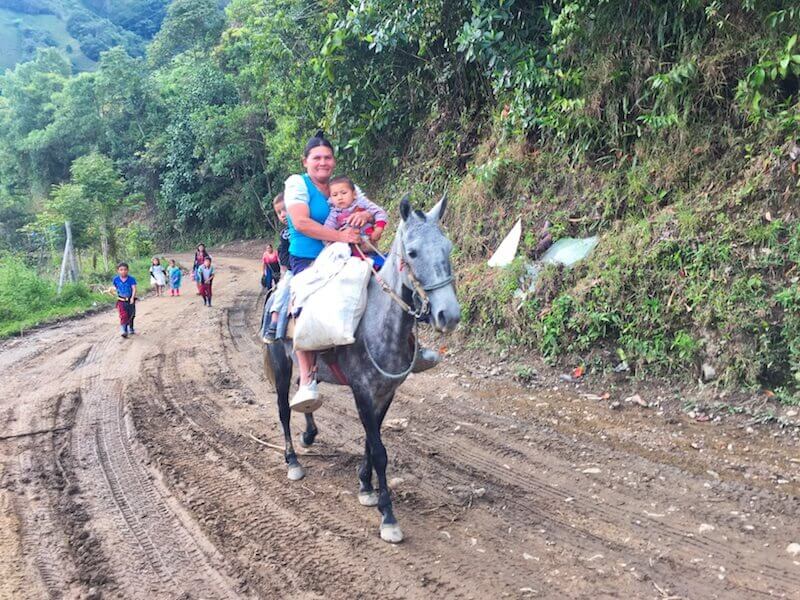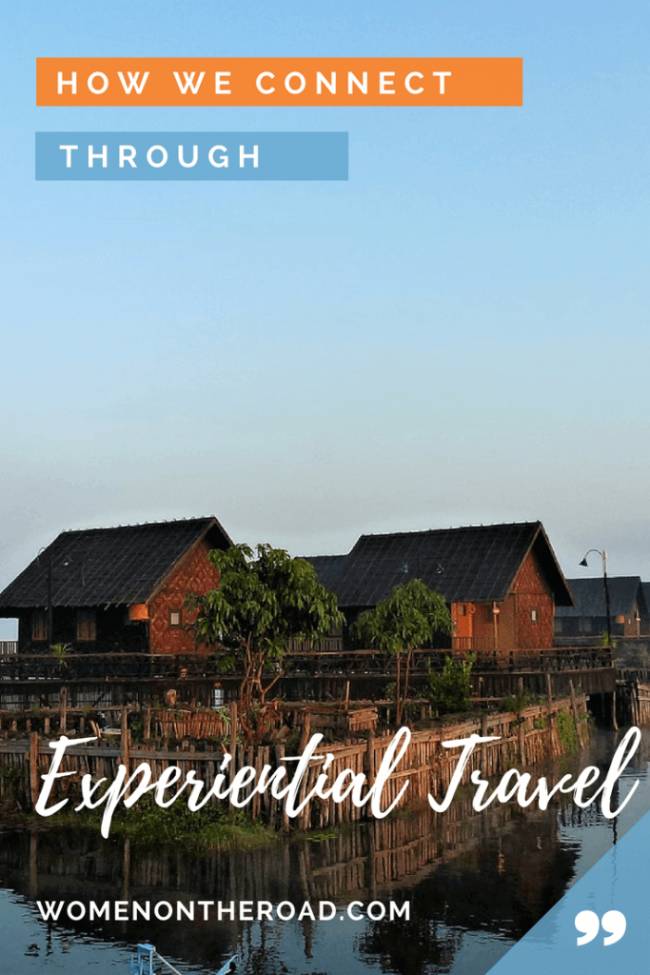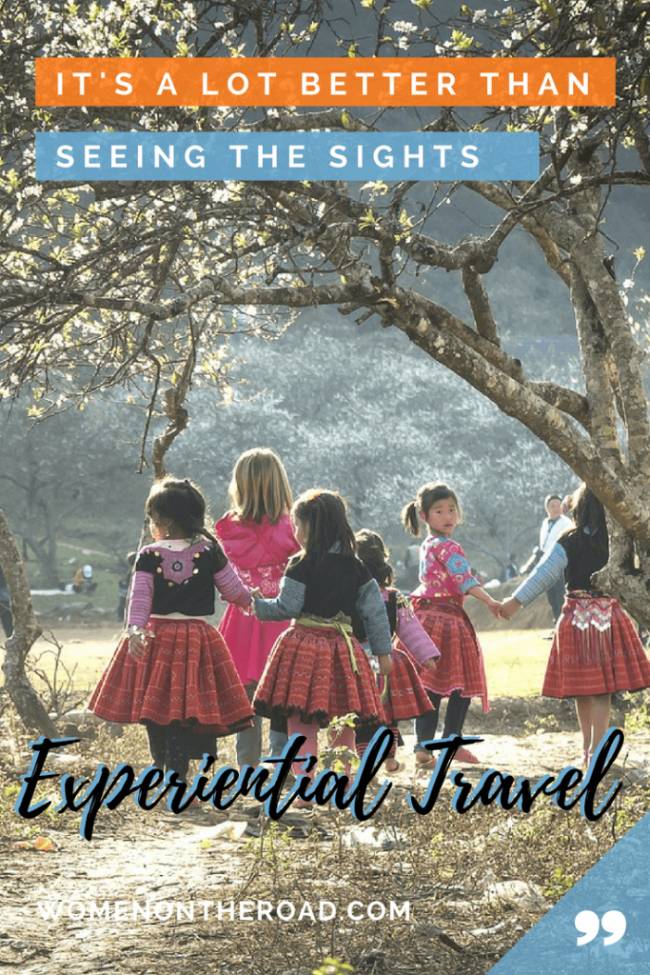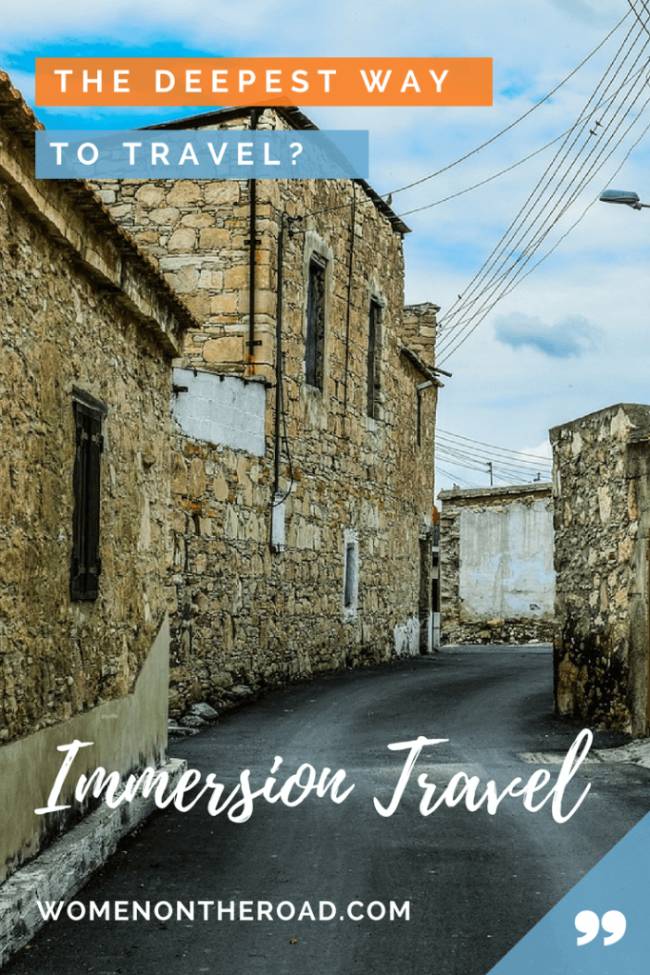When you take a cooking class in a local’s home or visit a market with a chef instead of simply eating in a restaurant, that’s experiential tourism or travel.
And if a conversation with a West Bank Palestinian or a Syrian refugee in Turkey enlightens you, builds a bond or sparks a change in perspective, you will have unwittingly wandered into the labyrinth of transformational travel, a form of experiential travel.
Whatever you call this clutch of travel styles – transformative or immersion travel or impact travel are yet other names – you’ll be part of a growing number of travelers for whom seeing places is no longer enough.
According to Wikipedia, the goal of experiential travel is: “to more deeply understand a travel destination’s culture, people and history by connecting with it more than just by visiting it. Therefore, the traveller usually gets in touch with locals who give guidance how to experience a place.”
Today we want to experience our destinations and their people and customs, and somehow be affected by them. Some call it a trend, but I believe this is part of a more aware society, one that is desperately eager to connect.

Whenever I travel, I look forward to any experiences that come my way. I still see the sights and go where everyone has gone before, but I do my best to meet people locally. I’m curious about how they live and that extra understanding helps me capture the essence of a place and delve below the surface.
When I visited Colombia, my trip was incredibly enriched by using a local tour guide and unexpectedly spending the night in a rural coffee planting community because our car had broken down. That one night and the conversations that ensued probably taught me more about Colombia than several weeks of travel.
I learned what life was like in an isolated rural community under the FARC (the Revolutionary Armed Forces of Colombia), back when when checkpoints dotted the road and getting in and out was more a question of luck than planning. These insights would never have emerged without the car breakdown, or the electrical storm that took out the power, forcing us all to sit and talk for hours.
BUT FIRST – WHAT IS EXPERIENTIAL TOURISM?
There’s no “fixed” experiential tourism definition but it conveys our need for greater immersion, for a more local experience or a more “authentic” one (although I’m not comfortable with the word authentic because I’m never quite sure what it means).
You could argue that most travel is experiential, as long as it evokes a change in thinking, sparks a feeling or teaches you something.
Perhaps. Yet many people travel without any kind of change, other than the scenery.
Yet many of us want to enjoy a more personal experience, and some of us want to emerge changed, affected, somehow improved.
The connection we make with a place helps us do that.
HOW EXPERIENTIAL TRAVEL AFFECTS US
If the whole point of experiential travel is to change in some way, however slightly, we need to take action to make this happen. Here are some experiential tourism examples we try:
- Break out of the bubble we use to protect ourselves and remove the barriers that isolate us from others – the tour group, the all-inclusive resort or the well-worn tourist circuit.
- Connect with individuals, real people with real lives. Some of these connections can turn into true friendships (I’m still in touch with friends I made when I traveled across Africa in the 1990s).
- Understand our destination better because we’ll actually see how people live, argue, love, eat, shop and have fun, which allows us to respect our differences and acknowledge our similarities.
- See places fewer people see, that “off the beaten path” we’re so keen to travel.
- Broaden our knowledge, open our minds and provide insight into our own lives and cultures.
- Become better global citizens because so many stupid policies and decisions are underpinned by ignorance or fear of others.
WHY IS EXPERIENTIAL TOURISM IMPORTANT?
Experiential travel has evolved for a number of reasons, mostly because we needed the world of travel to change.
We can rethink the way we travel
I admit I’ve often traveled simply for the sake of travel – a consumer of sights, in a way – but I am reexamining what I do when I travel, and how I do it, for many of the following reasons.
- A rebellion against globalization and cookie-cutter tours is prompting people to become actors and participants in their journey. Rather than simply be voyeurs, they are turning the experience into something vastly more personal.
- Many travelers want to connect with locals, not just see them as they whip by on the bus. We want to feel something personal when we travel. We want to learn about the people on the other side of the window.
- We want to understand a place from every angle – its history, culture, arts, traditions, politics. We are no longer satisfied with skimming the surface.
- We want to really know a place. Rather than the banter of a generalist tour guide who has memorized a script, we increasingly want to hear from an expert local guide, a historian, a specialist, a participant, someone who is deeply knowledgeable and passionate about our destination.
- Experiential travel means shedding stereotypes and meeting people on their own terms, not ours, and not according to the image we may have carried of them. It means being willing to challenge our views and beliefs.
- If we go beyond experiential to transformative travel, this means that in addition to the personal and authentic connection, we are seeking inner change, such as empowerment or illumination or self-discovery.
- An experiential journey might well be life-changing.
- And last but not least, the arrival of Covid-19 and its subsequent lockdowns and curtailments of freedoms of movement have made many of us rethink how we travel. When something is eliminated from our lives, like travel, we may appreciate it even more and not take it so much for granted.
How experiential tourism can benefit others
Not only is it good for us, the traveler, but experiential and transformational travel can also benefit the local community, which is something many of us want to do when we travel.
- Our money is kept within the community rather than being transformed into multinational profits. This isn’t a rant against big business and in many cases we’ll have to use corporations or foreign companies in the tourism industry for our travels. But when we can, we should do our best to go local. Putting money back into the community helps protect the very traditions and lifestyles of the people we have come to see. By finding opportunities at home, people are less anxious to leave to find jobs elsewhere, and communities can survive even in the face of change.
- Many cultures and traditions are threatened by globalization and development. Our visiting these communities and engaging with their cultures – a type of cultural trouble – can help strengthen their social fabric, which in turn helps preserve them.
- Just as we are enriched by connecting with different cultures, I’d like to think they are enriched by connecting with us – as long as we arrive with an open mind and without the erroneous belief that somehow, “we are better”.
UNIQUE TRAVEL EXPERIENCES THAT QUALIFY AS EXPERIENTIAL
So many kinds of travel qualify as experiential or transformative that it’s confusing. Like most “new” labels, they become trendy and everything gets thrown in there!
Making authentic connections through travel
Here are a few ways our travels can be experienced – and they all involve authenticity and connection in local experience travel:
- Booking through one of the many platforms to have dinners with locals
- How to (try to) live like a local when you travel
- Using locally owned homestays rather than impersonal commercial accommodation
- Most walking tours, which bring you closer to a place and its people
- Choosing places that have made an effort to become experiential tourism destinations
- Local tour companies that rely on people who actually live at the destination (my travels to Kyrgyzstan were very much experiential holidays, brilliantly organized by the community travel group CBT)
Volunteering as experiential travel
A popular type of travel that involves experiences is, of course, volunteering, often on a volunteer holiday. And age is no barrier – many women volunteer as seniors and return thoroughly fulfilled from their experience.
Learning as experience
Education and learning are part of the growing experiential travel trends we are seeing.
- Going abroad to study languages
- Learning to cook is always experiential, especially with a local chef
- Discovering traditional arts and crafts can be part of experiential vacations
Internal discovery and transformation
Many of us travel for self-discovery and empowerment.
- It can be as simple as tracing your roots to understand more about your family
- Or as profound as the empowerment you experience when you travel solo
- Self-discovery can even come through searching for wellness, like going on an ayurveda retreat
The different faces of travel experiences
Experiential travel can come in different styles, such as:
- Slow travel or tourism, which is related to local travel and encourages to get to know one place well rather than several places superficially
- Themed travel, which provides experiences based on a theme, such as literary travel or culinary travel
- Bringing your feelings and values into your trip, encouraging you to engage in responsible or ethical travel
A spiritual link to travel
Spiritual travel feeds the spirit and easily qualifies as experiential or transformational travel.
- Travel to sacred sites is one way to experience a spiritual awakening
- So are popular pilgrimages, like walking the Camino (these women’s pilgrimage stories might also be inspiring)
- Anything to do with meditation, staying in an ashram and similar experiences would qualify
Then there’s everything else
Some travel defies description, but I’ve listed it here because it has an impact on us, even if we don’t connect directly with other people.
- Visiting unusual travel destinations may not instantly connect you with others, but it connects you with yourself by pushing your boundaries.
- Taking a trip to an officially unrecognized country pushes boundaries differently, by forcing you to make a political statement.
- The idea of ghost tourism may seem odd to you but many people love the idea of possibly connecting with other worlds or realms.
- Art, too, can qualify as experiential but rather than connecting with others, you connect with yourself through affinity, and with the artist, through the work of art directly. There are plenty of linkages between art and travel, and especially with street art, which allows us to see deeply into very personal and contemporary thinking about a place.
DRAWBACKS OF EXPERIENTIAL TOURISM
Like everything, experiential travel has its imperfections.
Corporate vs community profits
Experiential travel companies are appearing everywhere and packaging the “travel experience” as a marketing ploy. Using such companies is not necessarily bad, because we don’t always have the time or knowledge to seek out the perfect local community; sometimes, we have to count on others to do the groundwork.
But as with all good things, they can be taken to excess and some companies end up commercializing the experience – which is exactly the opposite of what we’re looking for. The money is then repatriated as profit and the local community hardly sees any of it.
The dangers of overtourism
As certain less-frequented places become more popular, they will attract more visitors and risk becoming just like those places where busloads drop off their charges.
At the same time, a surge in popularity can overwhelm an unknown destination without the correct infrastructure.
The dangers of overtourism have been amply documented and even though the Covid pandemic gave certain destinations a respite, it was only temporary.
Fragile traditions
Our search for the “authentic” can be detrimental to the local community. As certain traditions become popular, the people to whom they belong may be tempted to please visitors and earn an income by providing what they think visitors expect – but if they try to live up to our expectations, they might be watering down their own traditions.
Pseudo-experiential travel
Many travels are “passed off” as experiential, but are nothing more than mass tourism with the application of a thin local veneer – for example, a quick swing through a local market with a group of 20 others, only to be able to say you’ve been there.
And in these times of social media and sharing, nearly every journey is replicable. You can see someone’s trip or duplicate their itinerary and follow in their footsteps. For many people this is helpful (I too publish itineraries, like this one-day Madrid visit). But some independent travelers could end up feeling they’ve had a cookie-cutter vacation.
As I write this, I’m planning a visit to Paris and after poring over a multitude of guides and suggestions, I’ve decided to simply wing it for a day or two, just choosing a point of departure and not planning anything else. Wandering. Exploring. Observing. Chatting. Moving with the city rather than trying to shape it to any kind of norm.
So if things start feeling too easy or familiar, veering off the path is not only to be recommended, it is essential. Chuck the itinerary, hop on the bus and sit next to another woman and smile. You may be met by a suspicious glower – or you may be met by a smile in return. It could be the start of a connection.
Reaching out in understanding rather than closing up in suspicion. These experiential tourism trends appear here to stay.
— Originally published on 24 May 2018



